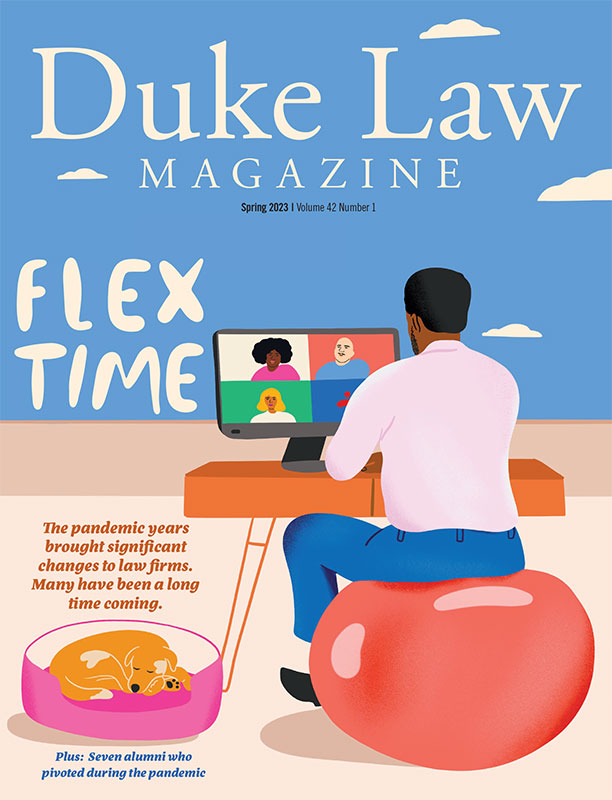
Amanda Martin
Veteran media lawyer joins First Amendment Clinic
Amanda Martin, a veteran communications attorney with extensive experience in media law, joined the faculty in July as senior lecturing fellow and supervising attorney in the First Amendment Clinic.
A founding partner of Stevens Martin Vaughn & Tadych of Raleigh, which has represented local, state, and national media outlets including The New York Times and The Washington Post, Martin has counseled clients on avoiding libel suits, responding to subpoenas, gaining access to public records and meetings, privacy laws, social media, and other speech-based issues.
Since 2003 she has served as general counsel to the North Carolina Press Association, which represents more than 150 newspapers, and advised countless reporters around the state through its legal hotline. She is co-author of the North Carolina section of the Reporters Committee for Freedom of the Press Open Government Guide and co-editor and contributing author of the North Carolina Media Law Handbook.
“I am delighted that Amanda has joined the First Amendment Clinic full time,” says Clinic Director and Clinical Professor Sarah Hutt Ludington JD/MA ’92. “Amanda worked with us in the fall of 2021 and proved to be an outstanding colleague and teacher. I believe that her addition will deepen our connection with the state media law community and raise the profile of the clinic.”
Raised in the “idyllic” setting of Gulf Breeze, Fla., on a peninsula in Pensacola Bay, Martin majored in journalism at the University of Florida and received her JD from the University of North Carolina School of Law. After beginning her career at an Atlanta firm, Martin practiced at Everett Gaskins Hancock & Stevens in Raleigh until co-founding Stevens Martin Vaughn & Tadych in 2010 with longtime law partner Hugh Stevens, a renowned First Amendment and media lawyer.
Martin has taught at UNC Law, the UNC Hussman School of Journalism and Media, and Campbell Law School. After her 2021 semester in the clinic, she decided to make a career change.
Martin says she told longtime clients, “I’ve done this for 30 years. I’m hoping now to develop the next generation of ‘me.’ And I think that gave them a good feeling about it because they need the help.” She remains of counsel at the firm and continues to represent the NC Press Association.
Martin relishes the opportunity to mentor students, as Stevens — whom she calls “the world’s greatest mentor” — did for her over many years. She called teaching last year’s clinic cohort “amazing.”
“People enroll in the First Amendment Clinic because it’s an interest of theirs and they are very eager to do it,” she says. “Last fall, I would have happily hired any of the students in the clinic in my law firm, because they are so excited and it’s such interesting work. I feel so lucky to be here and be a part of this.”
A strong supporter of clinical legal education since her own experience in law school, Martin says clinics provide not only high-quality legal representation to clients who could not otherwise afford it, but train students in critical soft skills of client service, including maintaining regular communication, that their first jobs may not provide.
“Being a lawyer is part counseling and part advocacy and representation,” Martin says. “Helping advance your client’s legal interests but also being present as they go through the process is an important part of being a lawyer, and that’s true for any area of law — whether you’re helping a client with a contract or a lawsuit. It’s very hard to get that experience in law school, so getting to help actual people is a golden opportunity for students and they love it.
“The clients are always so grateful to have the help and they are happy for it to be a learning experience for the students as well. It’s a dual mission, the teaching and the client interests, and they just dovetail beautifully, which is why I’m so excited to be here.”
Launched in 2018 by Professor H. Jefferson Powell and directed by Ludington since July 2020, the First Amendment Clinic provides legal representation to individuals and organizations on a wide range of matters pertaining to freedoms protected by the First Amendment. Among other actions, clinic students and faculty have filed amicus briefs with federal courts and the U.S. Supreme Court, drafted civil complaints on behalf of journalists blocked from the social media accounts of public officials, challenged the removal and banning of books from North Carolina high school libraries, and secured a settlement in a long-running federal defamation case against a South Carolina man sued for comments he made online criticizing a real estate developer. The clinic also engages in policy advocacy.

